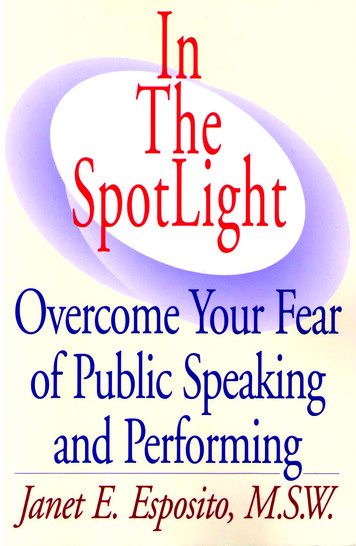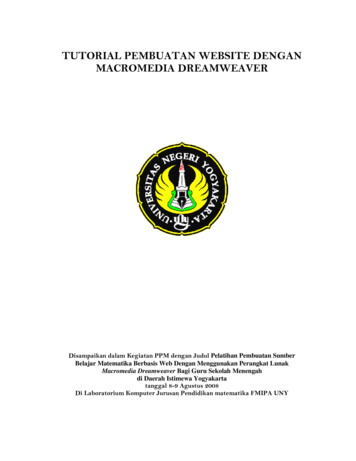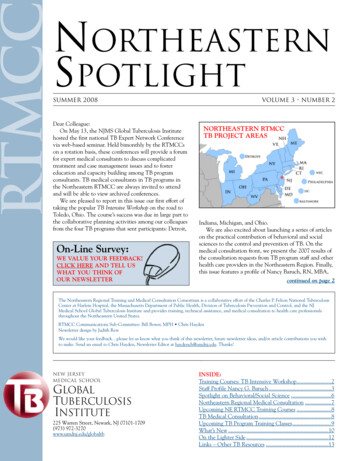
Transcription
In The SpotLightWhat Others Are Saying About In The SpotLight:In The SpotLight is a must read! Janet Esposito has taken aproblem shared by many, and experienced by most as shameful, and provided a wonderful set of strategies to overcome it.Janet offers a unique contribution to the field. She integratesthe powerful techniques of motivational enhancement andself-development with cognitive behavioral methods to produce perhaps one of the most powerful treatment formulas forsocial anxiety and speaking phobias. It is a pleasure to readJanet’s book and I expect that it will help anyone who reads itand uses it! I believe that if you read In The SpotLight, you willneed no other book on this topic.Andrew Magin, Ph.D.PsychologistDirector, The Connecticut Centerfor Anxiety DisordersSelf-Expression is the most basic of human needs. Some ofus, however, become paralyzed by anxiety and fears and areunable to communicate or perform effectively in public settings. Janet Esposito’s book can help readers transform theirprevious negative experiences into golden new opportunitiesin sharing themselves through self-expression. A must read foranyone who fears public speaking and performing!Dr. David N. GreenfieldAuthor of “Virtual Addiction: Helpfor Netheads, Cyberfreaks, and Those WhoLove Them”CEO, The Center for Internet StudiesPresident, The Connecticut PsychologicalAssociation
Janet E. Esposito, M.S.W.In The SpotLight is a real gift to people experiencing anydegree of fear or discomfort in speaking or performing in frontof others, either in formal or informal settings. Janet Espositodemonstrates sensitivity, wisdom, and passion in guiding herreaders on the path to overcoming their fears and discoveringa new-found freedom and power in self-expression. Herenthusiasm for her topic makes for easy and lively reading.You will want to read In The SpotLight if you have anyanxiousness in speaking or performing in front of others!Sharon McQuaide, Ph.D.Assistant Professor, Fordham University GraduateSchool of Social ServiceIn The SpotLight should become a handbook for people inthe performing arts as well as those who are interested in succeeding in other occupations. Its exercises are a guide to developing communication skills that are essential to all relationships, both professional and personal. Janet Esposito has donea tremendous service to those whose potential has been limited by their social anxieties.Cathy Lipper, M.S.W., D.C.S.W.Adjunct Professor, Western Connecticut StateUniversity
In The SpotLightPSYCHOLOGY/SELF-HELPFirst EditionAre You Tired of Suffering from Stage Fright? Have youhad enough of feeling terrified of speaking or performing infront of others, and trying to avoid it at all costs? If so, IN THESPOTLIGHT is perfect for you! The book is an extensive guideto the principles, methods, and strategies that can help you getbeyond stage fright and create a whole new possibility forcomfortable and confident speaking and performing.You will discover how to: Break through your feelings of intense fear and loss ofcontrol associated with speaking or performing in frontof others Minimize your uncomfortable physical symptoms associated with panic Reduce the dread of anticipating a speaking or performingevent Eliminate your need to avoid situations of speaking or performing because of fear Create a relaxed and confident state of mind and body inpreparing to speak or perform Transform your fear into a positive energy and power inspeaking and performing that you never imaginedpossible!Janet Esposito, M.S.W., is a seminar leader, motivationalcoach, and psychotherapist in Danbury, Connecticut. She ispresident of In The SpotLight, LLC, a company specializing inhelping people to overcome stage fright and create new possibilities for confidence and courage. She speaks from first-handexperience because she has overcome her own terror aroundpublic speaking and now experiences a level of comfort andconfidence that she never thought possible. In her No MoreStage Fright classes she has helped hundreds of people overcome their fears through her compassion, inspiration, and profound understanding of the problem and the solution!
Janet E. Esposito, M.S.W.
Overcome Your Fear ofPublic Speaking and PerformingJanet E. Esposito, M.S.W.Published byStrong Books – Publishing Directions, LLC
Janet E. Esposito, M.S.W.First EditionSecond Printing 2001Third Printing 2003Fourth Printing 2005Fifth Printing 2007Published by In The SpotLight, LLCPO Box 494Bridgewater, CT 06752ISBN (10) 0-9742966-2-7ISBN (13) 978-0-9742966-2-3Copyright 2000 Janet E. EspositoAll rights reserved. No part of this publication may bereproduced in any form, or by any means, without thewritten permission of the author. Previously published andprinted in the United States of America by Strong Books Publishing Directions, LLC.ISBN 1-928782-07-8All orders and inquiries for In The SpotLight should beaddressed to:In The SpotLightPO Box 494Bridgewater, CT 06752(877) 814-7705Library of Congress Catalog Number: 00-132542
In The SpotLightDedicationTo my wonderful husband Rich, who always believed I wouldwrite a book, and to my delightful Golden Retriever Celia, whohas always inspired my creativity and joy.To my Aunt Pat, for her generosity and wisdom, I give mydeepest thanks.
Janet E. Esposito, M.S.W.DISCLAIMERThis book is intended for informational and educational purposes only. It is not meant to provide counseling or psychotherapy, nor to provide any medical advice. If you find thatany of the material in this book creates significant distress,please contact a professional immediately. Also be sure to consult with your physician if you choose to take a medication orherbal product to help you with your anxiety symptomsassociated with speaking or performing.
In The SpotLightAcknowledgmentsI would like to express my gratefulness to the many peoplewho have supported and encouraged me in the process ofcreating this book. First, I would like to thank the classparticipants who were willing to share their own experiencesin this book to help others. I would also like to thank all of myclass participants for their courage in taking the step to helpthemselves overcome their fear and for their enthusiasticresponse to my course. I would like to thank Rich and Ceila forgiving me all of the uninterrupted time I needed to devote myattention to my writing. I would like to thank DavidGreenfield, Ph.D. for holding me to my word that I would starta course to help people who have fear of public speaking orperforming, which ultimately led to my writing this book. Iwould also like to thank David for reading and reviewing mybook. I would like to express my deep appreciation to AndyMagin, Ph.D. for taking the time to read and review my bookand for the incredible acknowledgment and words of encouragement. I would like to thank Cathy Lipper, L.C.S.W. andSharon McQuaide, Ph.D. for their generosity of time and theirfeedback in reading an early draft of my manuscript and inreviewing my book at its completion. I would like to thankRoberta Buland, my editor, for her superb editing and herbelief in my work. I am also very thankful to Rose Esposito forher helpful comments in reading the final draft. I want toexpress deep appreciation to Brian Jud, who showed confidence in my book from the start and who walked me throughthe publishing process with much patience. I would like toacknowledge Pam Redmer for her patience and skill in creating an outstanding logo for my company, which was also usedon my book cover. I would also like to thank Tom Tafuri for hisgenerosity of time and talent in creating the design for my bookcover. I am grateful to Deb Polydys for her expert guidance indeveloping all aspects of my company, In The SpotLight, LLC.I want to thank my coachs William and Farah for their unending belief in me and their holding me accountable to the highstandards I set for myself. I also want to express my deepestappreciation and gratitude to Tony Robbins for his tremendously inspiring and transformational work, which hasallowed me to find the power inside of me. Finally, I want tothank all of the people who expressed interest and enthusiasmabout my work and who validated my own excitement aboutwriting this book.
Janet E. Esposito, M.S.W.About The AuthorJanet E. Esposito, M.S.W., A.C.S.W., B.C.D. is a licensed clinical social worker. Janet is the president of In The SpotLight,LLC, a company devoted to helping people overcome stagefright in the areas of public speaking and performing. Shecreated the No More Stage Fright workshop in 1998 to givepeople hands-on experience in learning and applying methods to overcome fear related to speaking and performing infront of others. Her workshop has also been helpful to thosewho experience any type of social anxiety in relating to others. In addition to leading group classes, Janet offers coaching by phone, in person, or by email for people wanting individual attention and support in working to overcome theirfear of public speaking or performing. Janet is also availableto businesses on a consulting basis and offers on-site workshops.Janet has been a psychotherapist for over twenty-two yearsand has been in private practice for the last sixteen years.Janet’s specialties have included helping people to overcomestage fright and other anxieties and phobias, stress management, personal performance and life coaching, and couplescounseling. Janet is a graduate of Smith College School forSocial Work.You can contact Janet by phone at 877-814-7705 (toll free ) oremail her at jesposito@performanceanxiety.com. You can alsovisit her web site at www.performanceanxiety.com.
In The SpotLightTable of ContentsAcknowledgmentsChapter 1: Coming Out of the ClosetSummaryAction Stepspage 1Chapter 2: You Are Not AloneSummaryAction Stepspage 7Chapter 3: Kindred SoulsSummaryAction Stepspage 13Chapter 4: No Guts, No GloryCreating True SuccessStarting a JournalSelf-Assessment of Your Experience withSpeaking or PerformingSummaryAction Stepspage 33Chapter 5: Fearing the Fear ItselfThe Spiral of FearMaking Peace with Our FearCreating a Safe PlaceGrounding YourselfThe Benefits of Deep BreathingDeep Breathing: Method OneDeep Breathing: Method TwoSummaryAction Stepspage 39Chapter 6: It’s Not About MeSummaryAction Stepspage 57Chapter 7: Creating Beliefs and Self-Talkpage 63that Support UsChallenging Imaginary FearsCreating a New Set of Beliefs and PredictionsBanishing the Critical Inner VoiceSummaryAction Steps
Janet E. Esposito, M.S.W.Chapter 8: Creating a Calm and ResourcefulBody and MindShifting PerceptionsMy Earlier PerceptionsMy Current PerceptionsCreating HumorCreating ConfidenceExpanding Your IdentityPositive Self-CareCreating a Relaxed and Resourceful BodyProgressive Relaxation MethodThe Autogenic Training MethodExpressing Emotional StatesCreating Resourceful LanguageSummaryAction Stepspage 81Chapter 9: Getting to the SourceUnderstanding the Source of Our FearGetting Beyond the Pain of the PastSummaryAction Stepspage 105Chapter 10: Overcoming SelfConsciousness and InhibitionStepping Out of the Comfort ZoneThe Risk of Appearing FoolishReducing InhibitionSummaryAction StepsThe Visibility ExerciseThe Outrageousness Exercisepage 117Chapter 11: Creating New PossibilitiesRevisiting Class ParticipantsSummaryAction Stepspage 127Afterwardpage 140Appendix: Feedback from No More Stage FrightClass Participantspage 142Referencespage 145Indexpage 146Quick Order Form
Coming Out Of The Closet1Chapter OneComing Out Of The ClosetI never imagined I would be writing a book until a fewyears ago, when I came out of the closet about my fear ofpublic speaking. Until then I had kept it a secret, sharing myintense fear and dread with only a few trusted family membersand friends. I always felt ashamed about having this problem.My biggest fear was that other people would find out howanxious and fearful I was, and they would think there wassomething really wrong with me. I always wanted to berespected by others, and my deepest fear was that I would loseall credibility and respect if they detected my terror inspeaking in front of others. This fear was magnified by what Iimagined people would think, knowing I am a psychotherapist. I felt that people would question my soundness as atherapist if I could not even control my own emotional statewhen it came to speaking in front of a group of people.I usually felt okay when I was speaking to an individual oronly a few people in an informal setting. Sometimes, though, Ihad a surge of anxiety if I felt intimidated by a particularperson or situation, or if I had a moment of self-consciousness
2Janet E. Esposito, M.S.W.about being the center of attention. The real panic, though,came when I had to speak in a more formal setting. Thisranged from having to introduce myself in a new situation,such as in a class or seminar, to having to give a formalpresentation of any length. My fear escalated even further if Iwas called upon to speak in front of a larger group of ten ormore people, which I had to do from time to time.Over the years my fear worsened. I was filled with terrorand dread whenever I was faced with having to present myselfin front of others, even if the spotlight would be on me for onlythirty seconds! Along the way, I started to have symptoms ofa full-blown panic attack when I knew I had to speak in frontof others and there was no way out of it. I felt humiliated bymy desperate state and I began to think there was somethingreally wrong with me.I remember doing all that I could to try to get out of having to speak at meetings or give presentations. While I wasable to pull this off many times, there were also times that Icould not avoid the inevitable and I had to speak. When Iknew I would face a situation where I would have to speak upin a group, or give a formal presentation, I became filled withdeep fear and dread for days, weeks, and even months inadvance. I would be preoccupied with this dark cloud looming ahead, and it felt as though I were being given a death sentence. Not only was I afraid of speaking in front of others, butI was also terrified of the deep loss of control I felt in my mindand body while I was in this state of intense fear. The fear ofmy own loss of control and the fear that others would see meso out of control ultimately fueled my fear into panic.I suffered alone with this fear and experienced a silent terror anytime I faced a situation where I had to speak. I began toorganize my professional life around avoiding meetings andother speaking engagements. I was able to do this quite successfully, especially when I went into private practice and wasnot part of a larger organization. Years went by and I became
Coming Out Of The Closet3content in my avoidance. Little did I know I was worseningmy problem by the very act of avoidance. All I knew is that itkept me safe and comfortable.About five years ago I was confronted with having to facemy fear again when I joined a partnership in a private practicegroup. One of the first things my partners proposed was thatwe make a joint presentation at the local hospital where I usedto work. My initial reaction was panic, and I immediatelystarted to think of ways I could get out of it. Fortunately, mynext reaction was that I was fed up with my avoidance tacticsand finally said to myself “Enough is enough.” At thatmoment I knew that I must try to get over my problem, eventhough I did not believe I could. I then began to see this presentation as an opportunity to confront my fear once and for all,as I was starting to become tired of the fear standing in myway. In the months prior to the presentation, I undertook amassive effort to learn ways to reduce my panic and anxiety.When the time came to give my presentation at theDanbury Hospital Grand Rounds, I was delighted to see mysuccess in reducing my symptoms of fear using certain principles and strategies. I felt really encouraged. After that I continued my search for more methods to help myself overcomemy fear, and I found myself becoming more and more confident that I could beat this thing. I also began to take morerisks to speak up and, while initially very anxious, I was ableto tolerate my discomfort and not let it stop me as it had before.I now had certain methods I could use to reduce my fear tomore manageable levels. I was no longer feeling so out of control, which allowed me to take more risks. I began to notice agrowing trust and confidence in myself and in my ability tospeak up, so that my deep fear and dread about speakingbegan to noticeably lessen. I was both shocked and totallydelighted to see this was happening because I had not believedI could really overcome this fear. I had always thought itwould be a lifelong affliction that I would have to bear.
4Janet E. Esposito, M.S.W.As a therapist, I have specialized in helping people whohave a wide array of anxiety problems. In recent years I havebecome most interested in helping people who have phobiasrelated to speaking, as well as performers such as singers,musicians, actors, and actresses who have performance anxiety. In my practice I had helped many people having this typeof problem on an individual basis. I began to see results myclients were getting by using the methods that I had used tohelp myself. I then decided to start a course to teach thesemethods to groups. In this way, group participants could havea hands-on opportunity to practice the methods while speaking or performing in front of others.As people took my course and enthusiastically spoke ofhow helpful the methods were in reducing their fears and inhibitions about speaking or performing in front of others, I decided it was time to share these ideas with others on a larger scale.That is when I decided to write this book, which will be followed by an audiotape series. Helping others like myself whohave suffered from this fear has become a driving force in mylife. It has become a mission for me to do whatever I can toguide and inspire people to overcome this fear, which has heldso many of us back from fully and comfortably expressing ourselves in front of others. This mission has given purpose to mysuffering and is an exciting example of turning a problem intoan opportunity to help others!SUMMARY: Experiencing panic and dread of public speaking orperforming often creates feelings of shame and a feeling ofbeing alone in your suffering. Continuing to avoid situations of public speaking orperforming tends to worsen the fear over time.There is a way out of this problem!To overcome this problem, you must make a full commitment to do what it takes to learn and apply the principles
Coming Out Of The Closet 5and strategies that reduce fear and build confidence inyourself in this area.You have the right to fully and comfortably express yourself in front of others and to not be held back by this fearany longer!ACTION STEPS: Vow to yourself right now that you will do what it takes toovercome this problem. Decide that you will no longer be held back by this fear and that you have the need andright to fully and comfortably express yourself in front ofothers!Set aside regular weekly time to read this book and do theexercises. Make it a priority to schedule the time for this.Vow to yourself now that you will complete this book andnot allow other things to get in the way.
6Janet E. Esposito, M.S.W.
You Are Not Alone7Chapter TwoYou Are Not AloneThe fear of public speaking has been reported to be thenumber one fear of American adults. You may have heard thejoke that most people would rather be in the casket than haveto give a eulogy at someone else’s funeral!While the surveys have focused on public speaking, manyperformers face a parallel fear related to the similar issue ofbeing the focus of others’ attention and having their performance evaluated. Given the similarities in the way the fear isexperienced, and in the methods used to reduce performanceanxiety for both, I will be making reference to both speakingand performing throughout this book. Performers who haveattended my No More Stage Fright classes have been equallyhelped by the methods used, which will be outlined in the following chapters.While most people experience some degree of stage fright,there is a big distinction between those people who have thetypical butterflies in their stomachs and report that the antidoteto their fear is to be well-prepared and rehearsed, and those ofus who experience dread, terror, and panic at just the thought
8Janet E. Esposito, M.S.W.of speaking or performing in front of others. Being well-prepared and rehearsed does little to reduce the intense fear forthose of us who have a much stronger case of stage fright. Forus, the fear goes much deeper. It is a feeling of being emotionally unsafe when being exposed and vulnerable in front of others. We have come to mistrust ourselves because of the loss ofcontrol we have experienced in our minds and bodies. Ourfear often gets worse, rather than better, as we do more speaking or performing over time. The old advice of “Just be wellprepared and you will do fine” does not work for us. It makesus feel even more alone and misunderstood.You are definitely not alone. Most of us who have this highlevel of fear go to great lengths to try to hide it because we feelso ashamed of it. I was able to hide my fear pretty effectivelyand people were shocked to hear I suffered from this problem.I have always been seen as an outgoing, well-spoken, and confident person. There are many people who appear this waywho are secretly suffering! There are also many people whotend to be shy and socially uncomfortable who are terrified ofbeing called upon to speak in front of others.A study based on 1998 Census data done by the NationalInstitute of Mental Health (NIMH) on the prevalence of different types of Anxiety Disorders estimated that 5.3 millionAmerican adults between the ages of eighteen and fifty-fourhave a Social Phobia. Fear of public speaking and performingfalls within the category of Social Phobia if it meets the criteriaof creating significant distress for the person or interfering significantly with his or her occupational, academic, or socialfunctioning. Most of us drawn to seek out help for this problem suffer deep distress and end up feeling very helpless in theface of this inner struggle. For most of us, this problem has alsolimited us professionally, academically, or socially. It hasstopped many of us from completing higher education, fromgoing into certain careers, from pursuing opportunities for professional advancement, from expressing ourselves in meetings
You Are Not Alone9and gatherings, or from pursuing other things of importance tous when it might involve being put on the spot to speak or perform in front of others. Fear of public speaking and performing often takes a big toll on our self-esteem and leads us to feelsome degree of inadequacy and inferiority, especially when wecompare ourselves to others who seem able to speak or perform with ease and confidence.My purpose in discussing this problem as a Social Phobiais not to have you label yourself as a “Social Phobic” but,rather, to help you better understand the type of problem youhave. Fear of public speaking and performing does not reflecta character flaw or personal weakness. It is one type of phobiawithin a larger category of anxiety problems. While you mayfeel this is the worst problem you could possibly have, I assureyou it is not. There are people who are severely impaired by arange of problems with anxiety, depression, and other emotional challenges. While I do not mean to minimize the problem, as I am well aware of the intense suffering and limitationsit can create, it is also important to get some perspective onwhere the problem lies in the range of emotional challengesthat people face in their lives.One of the essential features of a Social Phobia is a markedand persistent fear of one or more social or performance situations in which embarrassment may occur. Being exposed to asituation like this creates an immediate anxiety response andoften leads to a panic attack. Most often, the social or performance situation is avoided if at all possible and, if not possible, it is endured with dread. People with this fear are afraidothers will judge them to be anxious, weak, “crazy,” or stupid.Marked anticipatory anxiety generally occurs, often far inadvance of the anticipated speaking or performance event.Other features that someone with a Social Phobia mayexperience are oversensitivity to criticism, negative evaluation,or rejection; difficulty with being assertive; and low self-esteemor feelings of inferiority.
10Janet E. Esposito, M.S.W.While some people with a Social Phobia have a generalfeeling of low self-esteem, feelings of inadequacy, or socialunease, there are others who generally feel good about themselves, both professionally and personally, and who are skilledand at ease in many social situations. For the latter group, having this problem feels like a real contradiction to how theynormally see themselves and to what others expect of them,based on their generally high level of functioning. This wastrue in my case and led me to feel even more afraid that othersmight detect my problem, causing me to lose all credibilityand respect in their eyes. Part of my own healing from thisproblem happened when I came out of the closet about myproblem and I did not experience any feeling that otherslooked down upon me or treated me any differently. Quitethe contrary, people respected my courage for working on thisproblem and not allowing it to stop me from advancingprofessionally any longer.You may be questioning why you have this type of problem, as I often did. While there are no easy answers to thisquestion, there is almost definitely some combination of natureand nurture at play. Many of us who have this problem tendtoward being more anxious, which likely has some biologicalunderpinnings. Even more significant for many of us are somelife experiences along the way that have created a deep fear ofloss of control and a loss of trust in ourselves and often in others as well. To try to compensate for these feelings, many of ushave strived for perfection in order to try to control our world.Some of us may, instead, have given in to feelings of helplessness and passivity in response to feeling a loss of control. Ineither case, there is generally a deep-seated feeling of not beinggood enough, of being deficient or defective in some way, or ofbeing different from others in a way that will not be acceptedby others. This creates a feeling of shame and a fear of embarrassment and humiliation in exposing your true self in front ofothers. There is also a loss of belief and trust in yourself and
You Are Not Alone11in others and a feeling of not being emotionally safe to showyour true self. These feelings are often not within yourconscious awareness. The feelings that you are more aware ofare the intense discomfort and self-consciousness at being thefocus of attention and the fear that others will be able tosee through you and see all of your fears and perceivedinadequacies.You may wonder: So how did I get this way? For some ofyou, there may have been obvious things that have happenedin your life history that created these types of feelings and forothers, it may not be so clear. We will explore this further inChapter Nine to help you become more connected to thesource of your fear. It is important to know that there are reasons why you have this fear and that it does not reflect a character flaw or weakness. Understanding its origins and how itmay have taken hold in your life is generally helpful in comingto greater self-acceptance about having the problem. Whilethis understanding is helpful, it does not remedy the problemfor most people. There are many other methods to use toreduce the hold that this problem has over your life.SUMMARY: You are not alone. Fear of public speaking is reported to bethe number one fear in surveys of American adults. Many people with this fear try to keep it hidden and suffer insilence.There is a parallel fear among many performers who experience a similar fear related to being the center of attentionand having their performance evaluated. The methods wewill discuss work for anyone with performance anxiety.There is a distinction between those with mild to moderatefear and those of us whose fear is far greater and not lessened by preparation and practice alone.People suffering from high levels of fear of public speakingor performing generally have a condition called Social
12 Janet E. Esposito, M.S.W.Phobia. People with Social Phobia have a marked andpersistent fear and avoidance of social or performancesituations in which embarrassment may occur.This problem does not reflect a character flaw or weakness.Many capable and accomplished people suffer from thisproblem. There appears to be a combination of nature andnurture at play, which creates the source of this problem.ACTION STEPS: If you are like most people who have this problem andhave a feeling of shame about it, start right now to shift themeaning you have attached to having this problem. Youare probably thinking of this problem as a weakness or failing on your part, and that you should not have this problem and should have been able to beat it by now. Instead,I want you to think of this problem as a form of anxietythat has its roots in both a biological predisposition andyour earlier life experience. You have become overly sensitized to being the focus of attention in a situation of performance and evaluation by others. I would like you tohave compassion for yourself rather than judge yourselfharshly for having this problem. Having this problem isnot a statement of your strength of character as a person. Itis a function
a course to help people who have fear of public speaking or performing, which ultimately led to my writing this book. I would also like to thank David for reading and reviewing my book. I would like to express my deep appreciation to Andy Magin, Ph.D. for taking the time to read and review my book










